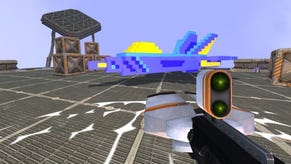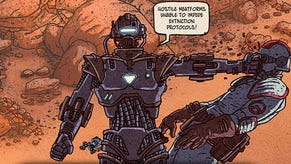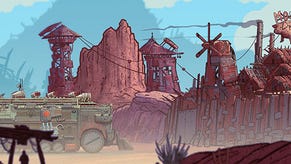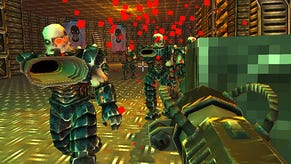Wot I Read: Christopher Brookmyre's Bedlam
Quake II: The Unofficial Novelisation
There have been many novels about videogames, as a visit to the Halo- and Mass Effect-strewn shelves of your local bookshop's sci-fi and fantasy section will reveal, but rather more rare are the novels about videogaming. Bedlam, a new sci-fi novel by renowned Scottish crime author Christopher Brookmyre, both is and isn't about videogaming. While it is centred around a high-concept take on the PC shooters of the early-to-mid 1990s, Brookmyre's own electronic weapons of choice, it's as much a plunge into a Tron-esque digital-made-flesh fantasy as it is an examination of why we play.
Quake II, Unreal, botmaches in Quake III and, at Bedlam's most contemporary perimeter, Half-Life are the types and era of PC gaming which define Brookmyre's novel, and although at times it seems to be exploring Second Life-like virtual world concepts, it doesn't really touch upon MMOs and the like. This serves the book well, as its in-game scenes are concentrated on the naive unreality and implausible tropes of 3D-accelerated shooters' earliest days, rather than on games which strive to more accurately recreate human existence. Quake II is the rarely-mentioned star of the show, though (at a guess for licensing-avoiding reasons) another, extremely similar but entirely fabricated, early 90s shooter named 'Starfire' is the official setting.
The book's protagonist, confusingly neurotic-yet-laddish scientific researcher Ross Baker, finds himself sucked into Starfire's humans vs Strogg alien cyborg war without end, and is soon questioning whether its brown canyons and randomly-placed rocket launchers are a fantasy, a dream, an experiment gone wrong or, in fact, the truth of his existence. Before too long, he finds himself in other games too, and is gradually able to employ the gaming skills of his youth in order to survive their reliably dystopic settings.
For much of the book, the essential mystery takes a backseat to a nostalgic trip through the tropes of gaming, and especially early first-person shooters. Respawning, quickloads, console commands, scripted setpieces and clipping errors all play their part, and if there's intended to be any true horror to Ross' predicament, it's somewhat lost to the clear fondness of author and hero alike for those youth-defining gaming experiences. It's a celebration of simple shapes, idiot AI, hax and the juevenile excess of id and Epic at their Voodoo-powered peak. This aspect of the book is not an affectation - the level of detail as Brookymre revels in describing the classic maps of his classic games reveals a clear and honest passion for the salad days of PC gaming. It out-nerds anything we write on this notoriously nerdy site, put it that way.
While Bedlam isn't afraid to poke fun at the intrinsic silliness of eternal wars in made-up, low-polygon worlds, it's very much a love letter to the games that made Brookmyre. It's infectious too - it had me yearning for that simpler age of less fettered escapism, when new shooters were sold on how bizarre their weapons and worlds were, on the wonder of their mere existence, rather than with multi-million-dollar online TV series or awkward on-stage presentations by Linkin Park.
In truth though, this nostalgia only preoccupies some of Bedlam's 400 pages. It's also a Vernor Vinge-esque tale of an interconnected electronic society, where the lines between organic and digital life begin to blur, though it's more interested in using this to conjure mystery and spectacle than it is in posing/answering questions about the Singularity. Though there's ongoing foreshadowing of what's really going on, answers and resolution happen in something of a hurry, with perhaps not enough time spent in the 'real' world to lend the wider outcome as much resonance as those early scenes exploring Starfire's starkly surreal world.
I found it hard, too, to sympathise with protagonist Ross - an Arthur Dent analogue but coarser of tone and more openly heroic, and unfortunately lacking in much pathos despite our knowledge that his very existence is in question. Perhaps too much time is spent on enthusiastic description of the wonders and horrors he encounters, and then again on a steady stream of blunted, coarse and Scots-inflected bon mots that are too at odds with any sense that Ross is in a terrifying situation and may not ever make it home to his pregnant wife and reassuringly mortal body.
In fact, Bedlam simply seems to be doing too much at once: the gaming nostalgia, the cyberpunk sci-fi and the Hitch-Hiker's Guide high-concept farce. Obviously humour is entirely subjective, but I felt the ever-present and often oddly loutish gags regularly stole the focus from any discussion (be it serious or comical) of just why these, by modern standards, absurd proto-shooters meant so much to now-thirty somethings, and how strange their tropes are if approached from a real-world perspective.
The future-tech meta-narrative is, I think, even more a victim of Bedlam's imbalance: big ideas are raised, but a degree of handwaving used to make it all work out. Ross' late-book plunge into skipping at speed through hordes of game 'worlds' also seemed too much, a carnival of shallow silliness at the expense of the more engaging brainstorming on how games would look and feel if make physical.
I really can't argue with the thrill of seeing the games of my youth transition to the printed page, and it's especially pleasing to see this done with clear affection rather than dry pomposity (I don't enjoy Vinge's writing anywhere near as much as I do his ideas) or the sneery 'gamers, eh?' stereotyping that's prevalent in film and TV's general depiction of this sub-culture. The playful riddle of which game Ross is in now, what will happen if he's 'killed' and how to outwit inhuman enemies: that's the stuff which works best here.
This is about PC games, not PC gamers, about recreating the polygonal universes of the past in proud prose, new perspectives on impossible worlds we have for long years taken for granted. If there is a Bedlam sequel (there is talk of this being a trilogy), I hope it can do more with that, with the majesty and the madness of gaming's internal logic (e.g. magical floating health-packs that only the game's hero can use), and dial back the uneven humour.
Bedlam, by Christopher Brookmyre, is released in hardback on February 7. You can read an extract here.










